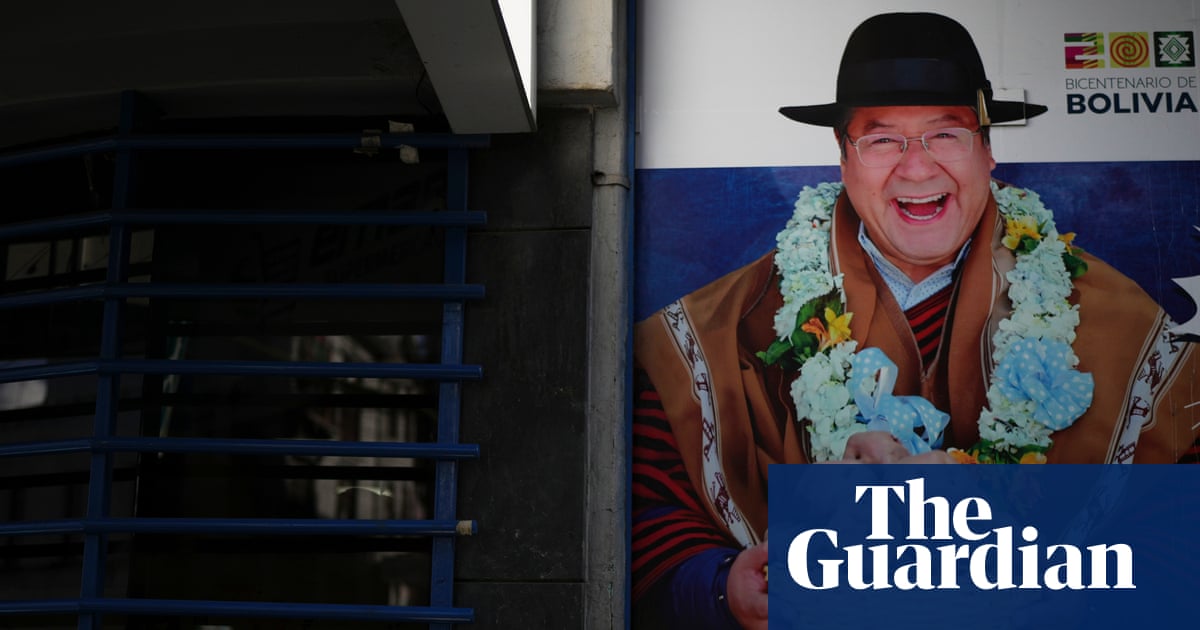Rightwing candidates lead polling ahead of fragmented left amid country’s worst economic crisis in four decades
Bolivians are going to the polls in an election that could mark a shift to the right – and the end of nearly 20 years of rule by the leftist Movimiento al Socialismo (Mas).
The party, which came to power with the first election of Evo Morales in 2005, risks losing its legal status if it fails to reach 3% – a threshold it has not hit in polls.
Two opposition candidates are virtually tied: centre-right business tycoon and former planning minister Samuel Doria Medina followed closely by rightwing former president Jorge “Tuto” Quiroga.
Deeply unpopular amid the country’s worst economic crisis in four decades, president Luis Arce, 61, decided not to run.
A former finance minister under Morales for 14 years, Arce took control of Mas gradually in recent years. He has nominated his 36-year-old minister of government, Eduardo del Castillo, who has been polling about 2%, to run for president.
Morales, 65, is the target of an arrest warrant for allegedly fathering a child with a 15-year-old that has led him to become entrenched in a coca-growing region of central Bolivia since October in an attempt to run for office again.
After registering with another party but being barred by constitutional and electoral court rulings, Bolivia’s first Indigenous president called protests that escalated into deadly clashes with police.
He is urging supporters to cast null votes on Sunday, claiming that if these outnumber the leading candidate’s tally, it would mean he had won.
“Before Morales’s call, null votes were about 10%; now they’re 12%. Even if it rises, I doubt it will go much higher – and null votes have many causes, not just him,” said political analyst Carlos Toranzo.
As polls have historically been unreliable in Bolivia, and many voters remain undecided, Toranzo believes there is still “a small chance” that a third name could make it to a potential runoff against Doria Medina or Quiroga: 36-year-old senator Andrónico Rodríguez.
The highest-polling figure on the left, placing between third and fifth, Rodríguez was once seen as Morales’s natural heir due to his Indigenous roots and leadership in the coca growers’ union, but was called a traitor for launching his own candidacy.
A longtime Mas member, the senator chose to leave the party and run with the leftwing coalition Alianza Popular – yet another sign of how fragmented the left’s vote has become.
Enrique Mamani, leader of the Aymara Indigenous organisation Ponchos Rojos, said he would back the senator, calling Morales the real traitor.
“Those calling for null votes are a handful of traitors to the struggle of our grandparents, who shed their blood and gave their lives so that one day we could have this right to vote,” he said.
About 7.9 million Bolivians are eligible to vote, with preliminary results due at 9pm local time.
The central issue of the campaign is the economic crisis, which analysts consider the worst since the 1985 hyperinflation, with shortages of dollars and fuel, long queues and soaring inflation.
If no candidate secures more than 50% of the vote, or at least 40% with a 10-point lead over the runner-up, an unprecedented second round will take place on 19 October.
For analyst Toranzo, one thing is certain: Mas will leave power, although it will be “difficult for them to hand it over, because they have held it for 20 years with near-absolute control of parliament, the judiciary and the electoral authority”.
Arce told the Guardian that he would respect the result if the right won.
Although acknowledging that his government was unpopular, he placed much of the blame for both the crisis and Mas’s decline on his former mentor, Morales, whose parliamentary allies, he said, “sabotaged and boycotted all our laws”.
“As Fidel Castro wrote in his book, ‘history will absolve us’ because in the long run the people will understand everything we had to endure,” said Arce, adding: “I’m sure the population will miss us afterwards.”
Source: www.theguardian.com
